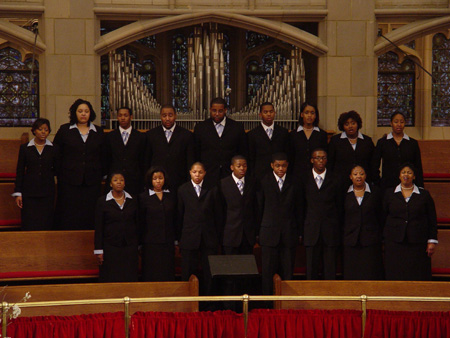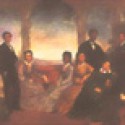The “Souls of Black Folk” ascended from the voices of 16 young singer-scholars in the Art Gallery of the Adam Clayton Powell State Office Building in Harlem Friday March 4. The Fisk Jubilee Singers of Nashville Tennessee evoked memories of the nation’s lingering slave legacy, performing stirring renditions of ancestral Negro spirituals and slave songs.
Originally formed in 1866 with support from the American Missionary Association and the United Church of Christ, the group is one of the oldest continuing performing organizations in the United States and the world’s most enduring acappella ensemble. While they once played to overflowing, enthusiastic audiences, in recent years these legendary singers have struggled to attract a new generation of listeners. The Jubilees rely heavily on Fisk alumni chapters and corporate support to subsidize touring expenses. Sponsored by Pfizer Corporation since the mid-1990s, the young singers’ annual Spring performance tour in recent years included venues like Carnegie Hall, the Riverside Church and Abyssinian Baptist Church in New York City, and the New Jersey Performing Arts Center, as well as concerts in Europe.

This year, fearing that the historic legacy of the Fisk Jubilee Singers may fade over generations unless efforts are made to attract new and younger audiences, a tribute reception was organized in New York to pay homage to the legendary singers. Many prominent educators, business and political leaders, and clergy came forward to endorse the idea of this city-wide honor.
The early Singers forestalled their own careers and educational pursuits to help build Fisk Jubilee Hall, the first permanent building erected for the education of Blacks in the South. To older generations of African Americans, the original Jubilees are regarded as authentic American heroes. Younger African Americans, however, know all too little of the foundations of American music, due in part to the de-emphasis on music and the arts in our public schools. Early African American musical slave narratives are still performed in churches across the nation, and serve as a vibrant and important musical art form that weaves an emotional tapestry of the slave experience in simple yet elegant ways that other media cannot.
The Negro spirituals were birthed more than composed, ebbing from the deepest wellsprings of the human condition. The songs performed by the Fisk Jubilees were used for private ceremonial and ritualistic occasions – the escape of a slave, hence “Steal Away;” “Sometimes I Feel Like a Motherless Child,” lamenting the broken bonds suffered by millions of chattel slave families that were separated, parent from child, husband from wife, grandparent from grandchild. Persistence against all odds is echoed in “Ain’t Gonna Let Nobody Turn Me Around” and the hope of a better life through “In That Great Gettin’ Up Mornin,’.”
Sung by the Fisk Jubilee Singers on Friday, these songs held the same emotional power and spiritual connection as they did 130 years ago. This seemed apparent in the response of the 100 attendees who experienced the music. Members of the famed Harlem Boys Choir seemed genuinely in awe and many in the audience were moved at times to joy and tears.
These simple yet elegant historic musical expressions are still performed by choirs at Hampton University, Morehouse College, and a host of historically Black colleges and universities, but it is Fisk University that is credited with introducing the Negro Spiritual to the world as an original American art form. Black intercollegiate rivalries still thrive and can be intense, whether played out in boasting rights on the gridiron, the hardwood court, or through the high-stepping flair of a marching band. Black alumni take tremendous pride in the uniqueness of their Alma Mater’s legacy, but what makes the Fisk contribution unique is the perpetual re-telling of the African American historical narrative through the music of the Jubilee Singers, who remain an enduring symbol of the irrepressible hope, potential, talent, and dignity of young Black people worldwide. The Jubilees’ tradition extends beyond mere song. Because of their example of self-sacrifice and self-reliance, they are cultural icons like the Tuskegee Airmen and the Four Horsemen of Notre Dame, modeling Black human potential and what all persons can achieve when dignity and talent are merged.
It was proper and fitting that Mayor Michael R. Bloomberg, who the night before had been honored by the United Negro College Fund for his unwavering support to its member institutions, declared Friday Fisk Jubilee Singers Day in New York City. Congressman Charles B. Rangel noted that because the Jubilee Singers know who they are and were, they have stood nobly for us all. The members of the ad hoc committee who agreed to endorse the Tribute Reception are to be commended for their vision because unless the older generation conveys the power, beauty, and dynamism of the Black musical experience and its foundations to our young people, they will never know the emotional power of early Black music.
As the organizer of the Reception Tribute I wish to thank all of those who signed on and endorsed the idea of the tribute to the Fisk Jubilee Singers in New York City. This was a small step to ensure that an important aspect of American culture continues to inspire, educate, and inform generations of our youth.
Dennis Day, Chair, Ad Hoc Tribute Reception Committee (Fisk Class of ’68)
Ad Hoc Committee Members: Dr. Joan Oby Dawson, Rev. Michel Faulkner,
Mr. William Freeman (Class of ’74), Mayor James Garner, Mr. Paul Jackson, Mr. Don King, Mr. Paul Kwami (Director, Jubilee Singers), Mr. Terry Lane, Mr. Wynton Marsalis, Dr. Lorraine Monroe, Congressman Charles B. Rangel (D), Mr. Claude Sharif Frazier, Ms. Valeria Spann (Co-Chair, Class of ’55), The Honorable Percy Sutton, Ms. Sylvia Woods.
© D-Day Media Group, Inc.
